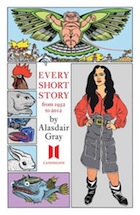Theo Tait delights in 60 years' worth of invention from the one-man band of Scottish letters

Alasdair Gray: 'Glasgow's Borges'. Photograph: Murdo Macleod
The novelist, playwright, poet, muralist, illustrator, pamphleteer and literary historian Alasdair Gray has been called all sorts of things: the 20th century's William Blake, Glasgow's Piranesi, "the greatest Scottish novelist since Walter Scott" (by Anthony Burgess), "a creative polymath with an integrated politico-philosophic vision" (by Will Self), a glorious one-man band, the dirty old man of Scottish letters. On the evidence of Every Short Story 1951-2012, we could slap a few more tags on to this bewilderingly varied talent: Glasgow's Borges, perhaps, or Scotland's VS Pritchett.
 Gray's two best-known novels, Lanark and 1982, Janine, are hybrids in which realism is echoed and amplified by wilder and more experimental forms. Lanark, conceived as an epic of postwar Scotland, is a Kafkaesque/Orwellian dystopia wrapped around a naturalistic portrait of the artist as a young man in 1940s and 50s Glasgow. It is now thought of as probably the classic Scottish novel of the late 20th century – a book which dramatised the hollowing out of the Empire's second city and helped make the recent flowering of Scots literature possible. 1982, Janine, which the author himself regards as his best work, is a lurid sado-masochistic fantasy, punctuated with political rants, which takes place inside the head of a drunken Scottish Tory; all this is set against another beautifully rendered realistic narrative, about the protagonist's sentimental education. The most accessible of his major novels, Poor Things, published in 1992, is a historical pastiche, a Victorian reworking of the Frankenstein story.
Gray's two best-known novels, Lanark and 1982, Janine, are hybrids in which realism is echoed and amplified by wilder and more experimental forms. Lanark, conceived as an epic of postwar Scotland, is a Kafkaesque/Orwellian dystopia wrapped around a naturalistic portrait of the artist as a young man in 1940s and 50s Glasgow. It is now thought of as probably the classic Scottish novel of the late 20th century – a book which dramatised the hollowing out of the Empire's second city and helped make the recent flowering of Scots literature possible. 1982, Janine, which the author himself regards as his best work, is a lurid sado-masochistic fantasy, punctuated with political rants, which takes place inside the head of a drunken Scottish Tory; all this is set against another beautifully rendered realistic narrative, about the protagonist's sentimental education. The most accessible of his major novels, Poor Things, published in 1992, is a historical pastiche, a Victorian reworking of the Frankenstein story.
Gray's collected short stories come in at an overwhelming 900 pages, in a handsome quasi-Edwardian hardback designed by the author, and illustrated with his distinctive frontispieces, mocked-up woodcuts, heraldic emblems, totemic symbols and line portraits of strong women. The book illustrates the vast range of his writing – and, it must be said, its sometimes very uneven quality.
Gray is a genius, a born storyteller whether at a visionary or a more down-to-earth level; even the poorest of the stories contains something intriguing or funny. But he's also a chancer and a bodger, given to cobbling together short stories from bottom-drawer leftovers. The incidental pleasures of Gray's books include the author's own commentaries – "critic fuel", he sometimes calls them. The endnote here, a brief critical autobiography (itself rehashed), is typically and charmingly open about his occasional need to rush a book into print in order to pay off debts or fund some other grand project.
Full review at The Guardian
 Gray's two best-known novels, Lanark and 1982, Janine, are hybrids in which realism is echoed and amplified by wilder and more experimental forms. Lanark, conceived as an epic of postwar Scotland, is a Kafkaesque/Orwellian dystopia wrapped around a naturalistic portrait of the artist as a young man in 1940s and 50s Glasgow. It is now thought of as probably the classic Scottish novel of the late 20th century – a book which dramatised the hollowing out of the Empire's second city and helped make the recent flowering of Scots literature possible. 1982, Janine, which the author himself regards as his best work, is a lurid sado-masochistic fantasy, punctuated with political rants, which takes place inside the head of a drunken Scottish Tory; all this is set against another beautifully rendered realistic narrative, about the protagonist's sentimental education. The most accessible of his major novels, Poor Things, published in 1992, is a historical pastiche, a Victorian reworking of the Frankenstein story.
Gray's two best-known novels, Lanark and 1982, Janine, are hybrids in which realism is echoed and amplified by wilder and more experimental forms. Lanark, conceived as an epic of postwar Scotland, is a Kafkaesque/Orwellian dystopia wrapped around a naturalistic portrait of the artist as a young man in 1940s and 50s Glasgow. It is now thought of as probably the classic Scottish novel of the late 20th century – a book which dramatised the hollowing out of the Empire's second city and helped make the recent flowering of Scots literature possible. 1982, Janine, which the author himself regards as his best work, is a lurid sado-masochistic fantasy, punctuated with political rants, which takes place inside the head of a drunken Scottish Tory; all this is set against another beautifully rendered realistic narrative, about the protagonist's sentimental education. The most accessible of his major novels, Poor Things, published in 1992, is a historical pastiche, a Victorian reworking of the Frankenstein story.Gray's collected short stories come in at an overwhelming 900 pages, in a handsome quasi-Edwardian hardback designed by the author, and illustrated with his distinctive frontispieces, mocked-up woodcuts, heraldic emblems, totemic symbols and line portraits of strong women. The book illustrates the vast range of his writing – and, it must be said, its sometimes very uneven quality.
Gray is a genius, a born storyteller whether at a visionary or a more down-to-earth level; even the poorest of the stories contains something intriguing or funny. But he's also a chancer and a bodger, given to cobbling together short stories from bottom-drawer leftovers. The incidental pleasures of Gray's books include the author's own commentaries – "critic fuel", he sometimes calls them. The endnote here, a brief critical autobiography (itself rehashed), is typically and charmingly open about his occasional need to rush a book into print in order to pay off debts or fund some other grand project.
Full review at The Guardian
No comments:
Post a Comment